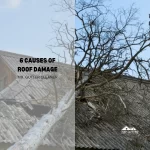Gutter inspections play a crucial role in maintaining a home’s health by ensuring that gutters are free from obstructions that can lead to water damage, foundation issues, and pest infestations. These inspections help identify potential problems early, preventing costly repairs and extending the lifespan of your gutters and roof.
Regular gutter maintenance not only protects your home from water-related issues but also enhances its curb appeal and overall value.
By conducting visual inspections and cleaning, homeowners can keep their gutters functioning properly.
However, recognizing when professional help is needed is essential for addressing more significant issues that DIY efforts cannot resolve.
Choosing the right gutter inspection service involves looking for experienced professionals, understanding service costs, and preparing your home for inspection.
Additionally, addressing frequently asked questions, such as the inspection duration, the feasibility of self-inspection, and signs that gutters need replacing, provides homeowners with the knowledge to make informed decisions about their gutter maintenance routines.
This comprehensive approach to gutter inspections underscores their importance in home maintenance, offering a pathway to a healthier home environment.
What Are Gutter Inspections?
Gutter inspections are thorough evaluations conducted to assess the condition of a home’s gutter system.
These inspections identify any issues, such as blockages, leaks, or wear and tear, that could compromise the gutter’s effectiveness in diverting water away from the property.
By ensuring that gutters are in optimal condition, homeowners can prevent water damage to their home’s foundation, siding, and landscaping.
Why Are Gutter Inspections Necessary?
Gutter inspections are vital for maintaining a home’s structural integrity and preventing costly repairs. Over time, gutters can become clogged with leaves, debris, and nests, leading to water overflow. This overflow can cause basement flooding, soil erosion, and damage to the home’s foundation. Inspections identify these risks early, allowing for timely intervention.
How Often Should You Inspect Your Gutters?
Experts recommend inspecting gutters at least twice a year, typically in the spring and fall. This frequency ensures that gutters remain clear of obstructions and function properly throughout the year. However, homes surrounded by trees may require more frequent inspections to address the continuous shedding of leaves and debris.
The Impact of Neglected Gutters on Your Home
Neglected gutters can significantly undermine the structural integrity and health of a home. When gutters are not regularly cleaned or inspected, they can become clogged with debris, leading to a slew of problems that endanger the home’s foundation, siding, and interior.
Water Damage and Its Consequences
Water overflow from clogged gutters can lead to significant water damage to a home’s exterior and interior. This overflow can penetrate siding, causing mold and mildew growth within walls. Additionally, water can pool around the foundation, leading to basement flooding and compromising the structural stability of the home. Regular gutter inspections and maintenance can prevent these costly damages by ensuring water is effectively diverted away from the home.
The Connection Between Gutters and Pest Infestations
Stagnant water in clogged gutters offers an ideal breeding ground for pests such as mosquitoes. Furthermore, debris-filled gutters can attract rodents and birds seeking nesting sites. These pest infestations not only pose health risks but can also lead to further gutter blockage and damage. Conducting gutter inspections helps identify and mitigate such issues, preserving the home’s hygiene and comfort.
How Clogged Gutters Affect Your Home’s Foundation
Perhaps the most significant impact of neglected gutters is on the home’s foundation. Overflowing water can erode the soil around the foundation, leading to cracks and instability. In extreme cases, this can cause foundational settling or shifting, requiring expensive repairs. Regular gutter maintenance, including inspections, cleaning, and necessary repairs, is crucial to prevent foundation damage and maintain the home’s structural integrity.
What Does a Gutter Inspection Involve?
Gutter inspections are critical for ensuring the longevity and effectiveness of a home’s gutter system. These inspections encompass a series of steps designed to thoroughly assess the condition of the gutters and identify any issues that require attention.
Visual Inspection: What Are the Signs of Trouble?
The first step in a gutter inspection involves a detailed visual examination of the gutters. Inspectors look for signs of wear and tear, such as cracks, holes, and rust. They also check for sagging sections or gutters pulling away from the house, which can indicate structural issues. Blockages caused by leaves, twigs, and other debris are identified, as these can lead to water overflow and damage to the property.
Cleaning Process: What Happens During Gutter Cleaning?
Following the visual inspection, a thorough cleaning of the gutters is performed. This process involves removing all debris from the gutters and downspouts to ensure unobstructed water flow. The use of specialized tools and techniques allows professionals to clean gutters safely and effectively, preventing potential water damage to the home’s foundation and landscaping.
Repair and Maintenance: Identifying Needs During Inspection
During the inspection, any necessary repairs or maintenance issues are identified. This includes sealing leaks, fixing loose brackets, and replacing damaged sections of the gutter. Regular maintenance, identified during these inspections, helps extend the life of the gutters and prevents more significant issues down the line.
DIY Gutter Inspection Guide
Conducting a gutter inspection yourself can be a practical way to ensure your home’s gutter system is well-maintained. This guide outlines the essential steps and precautions for effectively inspecting your gutters.
Safety First: Preparing for a DIY Inspection
Safety is paramount when performing a gutter inspection. Before beginning, ensure you have a sturdy ladder that securely reaches your gutters. Wear non-slip shoes and use gloves to protect your hands from sharp debris and edges. Having someone to spot you while on the ladder can provide additional safety.
Step-by-Step Guide to Inspecting Your Gutters
- Ladder Placement: Position your ladder securely against your home, ensuring it’s stable on even ground.
- Visual Inspection: Start by visually examining the gutters for signs of damage, such as cracks, rust, or sagging sections.
- Debris Removal: Carefully remove leaves, twigs, and any other debris clogging the gutters and downspouts.
- Water Flow Test: Use a garden hose to run water through the gutters, checking for proper flow and any leaks.
- Downspout Check: Ensure downspouts are directing water away from your home’s foundation effectively.
When to Call a Professional: Recognizing Major Issues
While many gutter issues can be addressed through DIY inspections, certain problems require professional expertise. If you encounter severe damage, such as large holes, extensive rust, or significant structural issues, it’s time to call a professional. Additionally, if your home is multiple stories or you’re uncomfortable working on a ladder, professional gutter services offer a safe and effective solution.
The Benefits of Regular Gutter Maintenance
Regular gutter maintenance is essential for protecting your home from potential damage and for ensuring the longevity of your gutter system. This routine care not only safeguards your property but also contributes to its overall value and aesthetic appeal.
Preventing Water Damage to Your Home
One of the primary benefits of regular gutter maintenance is the prevention of water damage. When gutters are clogged with debris, water cannot flow freely, leading to overflow and potential water intrusion into your home.
This can result in costly repairs to your foundation, basement, walls, and ceilings. By keeping gutters clean and free of blockages, you significantly reduce the risk of water damage and protect the structural integrity of your home.
Enhancing the Lifespan of Your Roof and Gutters
Regular gutter cleaning extends the life of both your gutters and roof. Clogged gutters can cause water to pool on your roof, leading to rot and deterioration over time.
Additionally, the extra weight of debris and standing water can strain your gutter system, causing it to sag, crack, or pull away from the house. Through consistent maintenance, you can avoid these issues, ensuring your gutters and roof remain functional and in good condition for years to come.
Improving Home Value and Curb Appeal
Well-maintained gutters contribute to the curb appeal and overall value of your home. Clean and functional gutters enhance the appearance of your property, making it more attractive to potential buyers. Furthermore, the assurance of a well-maintained home can increase its market value. Regular gutter maintenance is a small investment that pays off by keeping your home appealing and by preventing the need for expensive repairs due to neglect.
Choosing a Gutter Inspection Service
Selecting the right gutter inspection service is crucial for ensuring the health and longevity of your home’s gutter system. A professional service can provide a thorough assessment and take necessary actions to maintain or improve your gutter’s condition.
What to Look for in a Gutter Inspection Professional
When choosing a gutter inspection service, consider the following:
- Experience and Expertise: Look for a company with a proven track record of providing comprehensive gutter inspections and maintenance services.
- Licenses and Insurance: Ensure the service provider is licensed to operate in your area and carries insurance to protect against any liabilities.
- Customer Reviews: Check online reviews and testimonials to gauge the company’s reputation and customer satisfaction levels.
- Detailed Inspection Reports: A reputable service should provide a detailed report of the inspection findings, including any areas of concern and recommended actions.
Understanding the Costs: What to Expect
The cost of a gutter inspection can vary based on several factors, including the size of your home, the complexity of your gutter system, and the scope of the inspection. On average, homeowners can expect to pay between $100 and $250 for a professional gutter inspection. Some companies might offer packages that include cleaning services, which can be a cost-effective option.
How to Prepare Your Home for a Professional Inspection
To ensure a smooth and efficient inspection process:
- Clear Access: Make sure there is clear access to your home’s gutters. Move any obstacles that could hinder the inspector’s ability to navigate around your property.
- Inform Household Members: Let your household members know about the inspection schedule to avoid any surprises or conflicts.
- Discuss Concerns: If you have noticed issues or have specific concerns about your gutters, share these with the inspector beforehand to ensure they are addressed during the inspection.
Frequently Asked Questions About Gutter Inspections
Addressing common queries about gutter inspections helps homeowners understand the importance, process, and expectations associated with these inspections. Below are answers to some frequently asked questions.
How Long Does a Gutter Inspection Take?
The duration of a gutter inspection can vary depending on the size and complexity of your home’s gutter system. On average, an inspection can take between 30 minutes to an hour. Larger homes or those with more complex gutter layouts may require additional time for a thorough evaluation.
Can I Inspect Gutters Myself, or Should I Always Hire a Professional?
While homeowners can perform basic gutter inspections, identifying less obvious issues often requires the expertise of a professional. A professional inspector can recognize signs of wear and damage that untrained eyes might miss. For routine checks, DIY inspections are beneficial, but for a comprehensive assessment, especially if you suspect any significant problems, it’s advisable to hire a professional.
How Do I Know If My Gutters Need to Be Replaced?
Signs that your gutters may need replacing include:
- Persistent leaks or rust
- Numerous sections of the gutter sagging or pulling away from the house
- Significant damage or cracks, especially in multiple areas
- Frequent clogging, even after cleaning and repairs If you notice these issues, a professional gutter inspection can determine whether repair or replacement is the best course of action.


